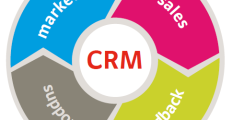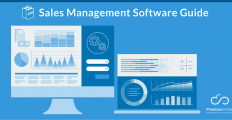 Cloud-hosted and hassle-free to maintain, sales systems and applications are now more accessible to small businesses than ever before. Unfortunately, a common downside of being offered a variety of options is the inability to make a good decision without time-consuming research. On the positive side, that’s not exactly impossible.
Cloud-hosted and hassle-free to maintain, sales systems and applications are now more accessible to small businesses than ever before. Unfortunately, a common downside of being offered a variety of options is the inability to make a good decision without time-consuming research. On the positive side, that’s not exactly impossible.
Do you have a B2B product you’d like to add to our listing?
If you are a vendor and have an interesting B2B product that hasn’t yet been listed on our review platform feel free to let us know about it. You can add your product to the listing here. Our experts will be happy to preapre a detailed review of your product free of charge. Here’s an example of a sales software review by us.
How to choose the best sales software for your business? Sales apps, the same as other corporate assets, should always be approached with a clear list of needs and priorities. In order to build those lists, nevertheless, the owner should answer several critical questions in advance:
Which market tier does your business belong to?
Your first consideration when you are buying a sales software solution for your small business is to find out which category or “tier” your business falls into. Businesses are categorized into categories or tiers based on the number of employees or staff they have as well as their annual sales. By considering your tier first, you can quickly eliminate all other sales systems that do not specifically cater to your category. One good rule of thumb you can have is the fact that majority of the software programs’ clients are generally in the same category that you are. You can immediately check this out by asking your sales staff.
Tier categories:
- Shrink wrap market: Businesses in this tier generally range in size of about 1 to 20 staff and have yearly revenue to as high as three million dollars.
- Lower market: Businesses in this tier generally range in size of about one to a high of 100 employees and have yearly revenue of about half a million to as high as fifty million dollars.
- Mid market: Businesses in this tier generally range in size of about 50 to a high of 1000 employees with yearly revenue of around 25 million to as high as 250 million dollars.
- Upper market: Businesses that choose software programs in this tier range in size of as over a thousand employees with yearly revenue of at least $100 million to as high as $500 million.
- Enterprise: Businesses that choose software program in this category generally range in size of over 2000 employees that have yearly revenue of at least $250 million.
Generally speaking, anyone researching sales software solutions will usually fall into the smaller tiers. Note that the categories overlap in the yearly sales and total employees and it is highly crucial, when you are selecting your category, to factor possible growth into your category decision as well as possible buying decision.
How a sales system can improve your business?
Sales systems and applications nowadays vary from simple POSs to complex pipeline management and CRM bundles, with features being the leading factor that determines their price. This is why it is important for every business owner to prepare a list of functions his sales program should complete, and narrow the choice down to few suitable products.
The main features offered by sales software vendors are:
Full Sales Automation
The main function of every sales system is to close more deals and to boost revenue, which is why quality samples are packed with automation features. They will manage all of your activities, tasks, and appointments from the same platform, automatically kick off follow-up emails, and give you full order-to-delivery visibility on every stage down the sales pipeline.
Inventory Management
In the best scenario, you will get a stock management platform integrated with your order directory, so that each customer can be served promptly and on time. Basically, the ideal sales software should also organize, manage, and track your products, orders, and deliveries. It is essential to understand whether you’re overstocked or understocked, and to eliminate the risks of making expensive mistakes and losing customers.
eCommerce & POS
If you are interested to manage an online store with this product, it is imperative to check whether it can meet your eCommerce needs. Put into perspective, this means that your sales system should be able to add/remove products from the list, build up catalogs, serve customers online, and facilitate checkout by integrating with popular payment gateways. Best-of-breed systems will also include accurate reporting, billing & invoicing, and automated tax calculation (nationally and overseas).
Lead Management & CRM
Another critical aspect of every sales system is lead management, so that the owner can merge sales processes and assignments, from lead to quote to conversion, and also benefit from reporting and comprehensive performance analysis. Lead management software allows you to analyze critical data such as lead time, conversion rates, and win-loss ratio. You can also get an accurate insight on your sales team’s performance for different products and services, locations, and customers.
Another smart course of action for startups and small businesses is to look for a sales-CRM bundle, so that they’d have a single platform to collect, organize, serve, and manage their leads. CRM functions are always welcomed to increase traffic, and engage customers on channels the business has not yet reached.
Marketing
Lately, quality sales products are delivered with an in-built marketing module, in order to make it even simpler for users to expand their reach with engaging and profitable campaigns. The marketing module is supposed to offer campaign and email management, data collection, resource optimization, and lead nurturing/conversion.
Analytics and Reporting
Sales insights are the core operable intelligence for every company, which is why an analytics-enabled system is always a good idea. Instead of hiring developers to help data flow from one system to another, you can always choose an intelligent sales performer that will measure critical indicators on its own. In the best case, the system will also allow you to export verified reports in any desired format.
Mobile optimization
With the advancement of technology, it no longer makes sense to build up in-house systems and manage data from local devices. What you should be looking for is a cloud-based and mobile-optimized solution where all critical operations can be conducted out of the office. This is particularly recommended to decentralized and international teams.
The first steps towards purchasing an ideal sales system
Look for an industry specific system
Another crucial factor to consider when selecting your sales software options is to select an industry-specific software solution. A dry cleaning company will generally have very different business needs than compared with, a restaurant or gift shop, or a liquor shop will have very different requirements than say, an appliance store.
While any given solution may sometimes work for your business, your business is not actually getting the specialized time as well as money-saving features that your business could benefit from. It is no doubt easy to spend your cash on a generic tool as compared with an industry-specific sales software, but your business would most benefit from a specialized tool. You will save yourself enormous energy and time.
Get to know the vendor
Once you have come up with a short list of your potential software tools, take time to track the company. It is crucial to find an organization that has been already established for quite a long time.
Why? It is because when you are buying a sales solution, you are not just buying a product. You are in fact, actually also buying the commitment from the vendor to be present when you need it for support. These include providing tech support, training, software updates, solving hardware problems and the other issues when you need to upgrade systems.
It is important not only that the vendor has a long standing history in servicing such products but also a good reputation for quality customer service.
Give solutions a test drive, and compare them
For real, take your time to do research. Do not simply ask another business what tool they are using or simply rely your decision on a site or a free demo version. Take the much-needed steps to evaluate which sales software products will actually fit your business needs as well as budget and then seek questions from various sales vendors. Get personal demonstrations of sales software programs as much as possible, ask for professional references, and call them. Using a B2B directory can also be a huge time-saver as it allows you to easily compare various apps agains each other.
Finding the right tool to optimize your business as well as time and financial resources can be overwhelming and challenging, but it is actually one you should take seriously.
What are top 5 best sales systems for small businesses?
1. TradeGecko

Developed to meet the needs of small and medium businesses, TradeGecko offers several pricing plans with adjusted feature suites, starting from $79 for the basic package. The downright, simple, and intuitive interface of this system that requires no training or costly installation makes it a preferred choice among sole vendors as well.
Detailed TradeGecko Review
In order to save time and cut expenses, TradeGecko automates most of the business’s core sales operations, among which managing stock supply and preparing elegant and enterprise-grade product descriptions, and sending automated reordering reminders. At the same time, TradeGecko performs as an end-to-end, or order-to-payment solution where the manager can process the order, send quotes, and fulfill them once they’ve been paid. What is really cool about this system is that it doesn’t require an additional accounting system to perform invoicing and to close deals – the company processes and tracks payments from the same platform where an order was made. Basically, you save again.
In terms of integrations, TradeGecko is once again a smart alternative, having in mind that it relates easily to leading marketplaces, ERP systems, accounting software, and social media. Prominent integrations include: Shopify, Magento, Amazon, WooCommerce, QuickBooks, EBay, Salesforce, and many other systems.
2. HubSpot Sales

HubSpot Sales is an automation and acceleration system targeting on-budget companies. It is best known for the smart eCommerce suite that meets the needs of various industries, and automates core sales operations. In terms of pricing plans, the company offers a free startup package with limited feature coverage, while its single paid plan is priced at $50/month.
Why choosing HubSpot Sales? The most accurate answer to this question is that it delivers enterprise-grade sales management to lower tier market participants. HubSpot Sales automates all sales-related operations, and saves valuable time at every stage of the funnel. You can use it to automate reminders and follow-up emails without being impersonal, and turn the most repetitive among them into standardized templates you could later use to measure the effects of your performance. HubSpot Sales also eliminates manual data entry, and does so in several handy ways. You can import your contact bases and have them displayed on your dynamic dashboard, or have critical metrics such as location, contact info, and clicks logged automatically whenever a customer opens an email. If you’re also using HubSpot’s inbound marketing suite, you can also ask visitors to fill a specific contact form, and focus on what is genuinely important for them – closing deals.
In a similar fashion to TradeGecko, HubSpot Sales can boast with several great integrations, but emphasizes more on CRM products than it does on accounting ones. Among its prominent connections, you will find Gmail, Microsoft Outlook, Zendesk, SugarCRM, BigCommerce, and many others.
Detailed HubSpot Sales Review
3. Freshsales

Freshsales is one of the leading small biz-friendly apps in this category, and for a good reason. The company behind it relied on several years of market experience to learn what customers need and expect from an ideal sales app, and consequently built a one-stop-shop solution offered on a reasonable price. Freshsales packages vary between $12 and $49 (depending on deal management features), while there is also an excellent free plan (Sprout) that manages leads, contacts, and deals, but also takes care of customer relationships.
Together with lead capturing, Freshsales can distribute, nurture, score, divide, and verify leads, and does so via multiple channels of communication. Users get into their hands an advanced suite of features, including auto-dialers, call recording, call routing and affiliate management, but the thing that certainly distinguishes Freshsales from similar programs is reporting. At its core, Freshsales has collated all functions of legacy CRM systems, but found its own way to optimize sales and prioritize pipeline opportunities. As president Dilawar Syed explains, Freshsales was even intended to be a dynamic analytic contributor, which doesn’t only reveal magnificent sales insights, but gives companies hints on how to use those to their advantage.
The best thing about Freshsales is its open API infrastructure, which means you can instantly connect it to any other app/business system currently included in your software ecosystems. Contact support for more information or detailed connectivity instructions.
Detailed Freshsales Review
4. Unomy

Unomy is what our experts like to call one-of-a-kind system, and that’s because its functionality goes beyond what you’d expect from a standard sales system. Generally speaking, Unomy is more of an informative lead collection hub that helps improve your market position, and develop smarter future strategies. What is really specific is the company’s quote-pricing policy, which means there are no fixed plans, and each business gets a quote specifically tailored to its needs.
How does Unomy work? This advanced platform helps internet-based companies gather, analyze, and process pertinent data. It quickly improves B2B deals in smaller corporate environments thanks to its sourcing, organizing, and prioritizing capacity. It offers detailed company/employee profiles that focus on real-time performance to help you compare contact information, and supports in such way the growth and development of your business. If you expect your business to speed up development, there is also nothing to worry about – Unomy caters to the needs of large businesses just as good as it does to small ones. Meanwhile, the tool that saves your time by means of prioritization and specification, one where you can import contacts and look for their credentials, or where you can use outstanding categorization to narrow search down to only few relevant companies. Consequently, your work becomes more success-orientated and ROI-effective.
With hassle-free integration as your priority, you should also give Unomy a second look. The system works with a great Chrome extension which is easy to install, and operates on all devices and browsing systems.
5. Pipedrive

Touted as one of the top sales apps featured on our platform, Pipedrive has plenty to offer to small businesses. It combines sales management and CRM functions on an easy to use and control dashboard, and shines in direct sales which are, as you’d agree, the focal point of interest for every developing business. It also has one of the most affordable pricing schemes on this list, with packages varying between $10 and $63 per user/month.
Pipedrive gives you a clear overview of your sales pipeline and effective sales methodology is built into the software. Adding deals in Pipedrive couldn’t be simpler: all you need to do is to click on the Add Deal button on top of the deals section, and fill in the data required in the pop-up dialog box (associated organizations, closure expectancy dates, stages, and scheduled activities). What Pipedrive is also good as is lead collection and management, as it gathers contact information using customizable Web Forms you can place directly on your website or newsletter, or create them manually within the Settings section. What is even better is that Pipedrive allows contact importation from third-party apps and systems.
Integrations are once again well-covered, having in mind that Pipedrive connects to 30+ systems and applications. Useful integrations include names such as MailChimp, ActiveCampaign, Quote Roller, Base CRM, Sage, and many more.
Detailed Pipedrive Review




























Leave a comment!